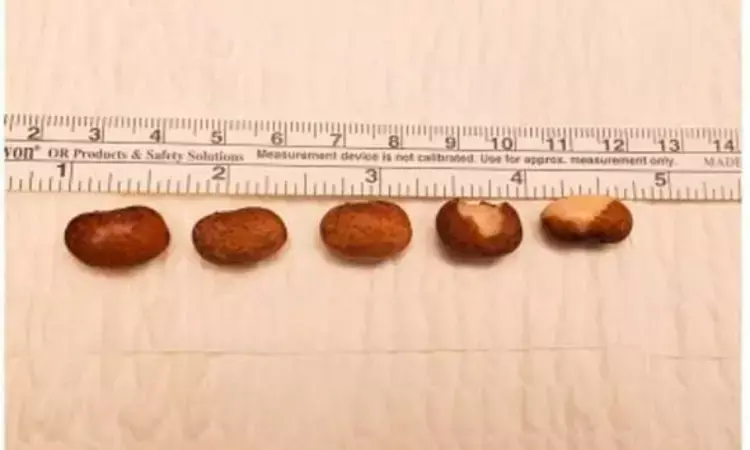- Home
- Medical news & Guidelines
- Anesthesiology
- Cardiology and CTVS
- Critical Care
- Dentistry
- Dermatology
- Diabetes and Endocrinology
- ENT
- Gastroenterology
- Medicine
- Nephrology
- Neurology
- Obstretics-Gynaecology
- Oncology
- Ophthalmology
- Orthopaedics
- Pediatrics-Neonatology
- Psychiatry
- Pulmonology
- Radiology
- Surgery
- Urology
- Laboratory Medicine
- Diet
- Nursing
- Paramedical
- Physiotherapy
- Health news
- Fact Check
- Bone Health Fact Check
- Brain Health Fact Check
- Cancer Related Fact Check
- Child Care Fact Check
- Dental and oral health fact check
- Diabetes and metabolic health fact check
- Diet and Nutrition Fact Check
- Eye and ENT Care Fact Check
- Fitness fact check
- Gut health fact check
- Heart health fact check
- Kidney health fact check
- Medical education fact check
- Men's health fact check
- Respiratory fact check
- Skin and hair care fact check
- Vaccine and Immunization fact check
- Women's health fact check
- AYUSH
- State News
- Andaman and Nicobar Islands
- Andhra Pradesh
- Arunachal Pradesh
- Assam
- Bihar
- Chandigarh
- Chattisgarh
- Dadra and Nagar Haveli
- Daman and Diu
- Delhi
- Goa
- Gujarat
- Haryana
- Himachal Pradesh
- Jammu & Kashmir
- Jharkhand
- Karnataka
- Kerala
- Ladakh
- Lakshadweep
- Madhya Pradesh
- Maharashtra
- Manipur
- Meghalaya
- Mizoram
- Nagaland
- Odisha
- Puducherry
- Punjab
- Rajasthan
- Sikkim
- Tamil Nadu
- Telangana
- Tripura
- Uttar Pradesh
- Uttrakhand
- West Bengal
- Medical Education
- Industry
Oral rather than IV acetaminophen in kids having tonsillectomies improves care, saves costs

SAN DIEGO - Providing children oral instead of intravenous (IV) acetaminophen to help manage tonsillectomy pain improves care at lower costs, according to research being presented at the ANESTHESIOLOGY® 2021 annual meeting.
"Tonsillectomy is one of the most painful surgeries," said Melissa Brooks Peterson, M.D., lead author of the study and associate professor of anesthesiology at Children's Hospital Colorado and the University of Colorado School of Medicine, Aurora. "Providing consistent and reliable dosing of acetaminophen orally starts the pain management pathway earlier for these children, who we know are going to wake up in severe pain."
Tonsillectomy — or removal of the tonsils, sometimes along with the adenoids — is one of the most common procedures in children, with more than 500,000 performed each year. Children may have tonsillectomies due to recurrent infections of the tonsils or because they are experiencing abnormal breathing patterns while sleeping, which in some cases can be dangerous.
Acetaminophen is the first step in pain management for tonsillectomies with or without an adenoidectomy at Children's Hospital Colorado. Prior to this study, some children were given oral acetaminophen before the procedure and others received it via IV during the procedure. Once the new physician anesthesiologist-led protocol was in place, all children began receiving oral acetaminophen 30 minutes to one hour before the procedure to ensure the medication reached peak blood levels when they were waking up from the surgery.
Because tonsillectomy is so painful, physician anesthesiologists at Children's Hospital Colorado employ a multimodal approach to pain management, meaning they use a variety of medications throughout the process to treat pain in multiple ways, thereby reducing the overall need for opioids after surgery. In addition to the acetaminophen prior to surgery, the multimodal approach includes giving children a high-dose steroid and an opioid medication during surgery. After the procedure, they receive a dose of a non-steroidal anti-inflammatory drug (NSAID) — usually ibuprofen. In the hospital and once home, children receive alternating doses of an NSAID and acetaminophen, which usually provides effective pain management. Children are given opioids only if they have breakthrough pain.
The researchers also conducted a survey of nurses and other staff before and after the protocol was enacted. Staff reported they were much more satisfied with the new protocol, including the care given to the children and their role in providing it.
"Nurses find managing kids in the recovery room after tonsillectomies can be challenging because the children go into the procedure fine and can come out of surgery in extreme pain," said Dr. Brooks Peterson. "Under the new protocol, perioperative nurses control the acetaminophen dosing. Getting medication into the patient in a more reliable way reduces variability, improves care for our patients and helps the nurses serve an important role in pain control."
Additionally, because IV acetaminophen is more expensive, switching from IV to oral acetaminophen saves more than $27 per patient, adding up to an annual savings of more than $50,000 at Children's Hospital Colorado.
Dr. Brooks Peterson notes the new protocol is an example of how physician anesthesiologists are leading the multidisciplinary team — including perioperative nurses, surgeons and nurse anesthetists — to design new pathways for pain control that are opioid-sparing and improve patient care at lower costs. The new process standardizes care, which also can help to reduce medical errors, she said.
Hina Zahid Joined Medical Dialogue in 2017 with a passion to work as a Reporter. She coordinates with various national and international journals and association and covers all the stories related to Medical guidelines, Medical Journals, rare medical surgeries as well as all the updates in the medical field. Email: editorial@medicaldialogues.in. Contact no. 011-43720751
Dr Kamal Kant Kohli-MBBS, DTCD- a chest specialist with more than 30 years of practice and a flair for writing clinical articles, Dr Kamal Kant Kohli joined Medical Dialogues as a Chief Editor of Medical News. Besides writing articles, as an editor, he proofreads and verifies all the medical content published on Medical Dialogues including those coming from journals, studies,medical conferences,guidelines etc. Email: drkohli@medicaldialogues.in. Contact no. 011-43720751


